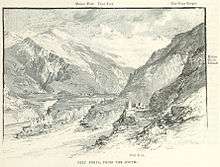Hunza–Nagar Campaign
| Hunza–Nagar Campaign | |||||||
|---|---|---|---|---|---|---|---|
| |||||||
| Belligerents | |||||||
| Hunza, Nagar |
| ||||||
The Hunza–Nagar Campaign was fought in 1891 by troops of the British Raj against the princely states of Hunza and Nagar in the Gilgit Agency (now part of the Gilgit-Baltistan of Pakistan). It is known in Pakistan as the "Anglo-Brusho War".
When Mortimer Durand, Secretary for State of India was appointed administrator of the Gilgit Agency, he opened up the region by building roads, telegraph, and mail systems while maintaining a dialogue with the Mir of Gilgit. He intended to improve the road from Kashmir through Hunza and Nagar and up to the frontier with Russia. The Mirs of Nagar and Hunza saw this as a threat to their natural advantage of remoteness. In 1890, Durant reinforced Chalt Fort that was near the border due to the rumor that Nagar and Hunza fighters were about to attack it, and continued redeveloping the road up to the fort. In May 1891, Nagar and Hunza sent a warning to Durant not to continue work on the road to the fort and to vacate the fort, which was on the Gilgit side of the border, else they would regard it as an act of war. Durant reinforced the fort and accelerated the road construction to it, causing Nagar and Hunza to see this as an escalation and so they stopped mail from the British Resident in Chinese Turkmenistan through their territory. British India regarded this as a breach of their 1889 agreement with Hunza, and after an ultimatum was issued and ignored they initiated the Anglo-Brusho Campaign of 1891. Hunza and Nagar came under a British protectorate in 1893.[1]

Colonel Algernon George Arnold Durand, commanded a force of approximately a thousand rifles and two guns.[2] The British gained control of Nagar during a battle at Nilt Nagar (Jangir-e-Laye) in 1891. The fort at Nilt was stormed, and after a fortnight's delay the cliffs beyond it were also carried by assault. Hunza and Nagar were occupied, the chief of Nagar was reinstated on making his submission, and the half-brother of the raja of Hunza was installed as chief in the place of his brother.
The British awarded three Victoria Crosses during this campaign.
See also
References
- ↑ Remoteness and Modernity: Transformation and Continuity in Northern Pakistan By Shafqat Hussain. Yale University Press, New Haven, 2015. p49-53
- ↑ Algernon George Arnold Durand, The Making of a Frontier: Five Years' Experiences and Adventures in Gilgit, Hunza, Nagar, Chitral, and the Eastern Hindu-Kush, (2002), (Adamant Media Corporation)
Further reading
- Charles Welsh (editor), Famous Battles of the Nineteenth Century, (1905), (Wessels).
- John Keay, The Gilgit Game: The Explorers of the Western Himalayas 1865-95 (1994) Oxford University Press